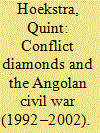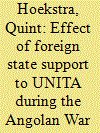| Srl | Item |
| 1 |
ID:
167066


|
|
|
|
|
| Summary/Abstract |
In the early 1990s several rebel groups turned to natural resource extraction to pay for war. A key form of this is rebel diamond production, commonly referred to as conflict diamonds, which is widely perceived as being highly beneficial to insurgent organisations. Yet in the Angolan Civil War (1992–2002), the use of conflict diamonds by the National Union for the Total Independence of Angola (UNITA) resulted in a decisive insurgent defeat. How can this outcome be explained? Offering a nuanced understanding of how conflict diamonds affect civil war, this article shows that although diamonds generated considerable revenue for UNITA, they were not an effective method for them to take on the Angolan government. This was for two reasons: internally, the rebels greatly struggled to convert their diamond proceeds into sufficient goods and services; and externally, it left the group highly vulnerable to international countermeasures in the form of United Nations Security Council sanctions. Natural resource extraction may therefore not be as useful to rebel groups as is frequently believed.
|
|
|
|
|
|
|
|
|
|
|
|
|
|
|
|
| 2 |
ID:
164152


|
|
|
|
|
| Summary/Abstract |
State support for foreign rebel groups has become more salient, yet it remains unclear how this affects armed conflict. This paper therefore analyses the effect of foreign government assistance and does so in the typical case of the Angolan War (1975–1991). It argues that South African and United States support greatly helped the National Union for the Total Independence of Angola (UNITA) wage a large and sustained insurgency campaign but was ultimately insufficient to overthrow the People’s Movement for the Liberation of Angola (MPLA) government because it enabled the incumbent government to obtain similar foreign assistance and because the level of aid awarded to UNITA fluctuated strongly, preventing it from engaging in meaningful long-term planning.
|
|
|
|
|
|
|
|
|
|
|
|
|
|
|
|
| 3 |
ID:
178679


|
|
|
|
|
| Summary/Abstract |
During the 1980s, the United States spent substantial political and economic capital supporting the Nicaraguan Contras. How effective was this in helping the rebels take on the Sandinista government? This article explores this topic by extending the application of principal-agent theory. It finds that, as expected, the effect of U.S. assistance was undermined by adverse selection and agency losses. However, the most important factor that undermined support effectiveness was the great inconsistency of the level of U.S. aid awarded to the insurgents. Reductions of official U.S. government support led to insurgency campaign collapse and meant that, in the end, the U.S. support program was only partially effective in helping the Contra struggle.
|
|
|
|
|
|
|
|
|
|
|
|
|
|
|
|